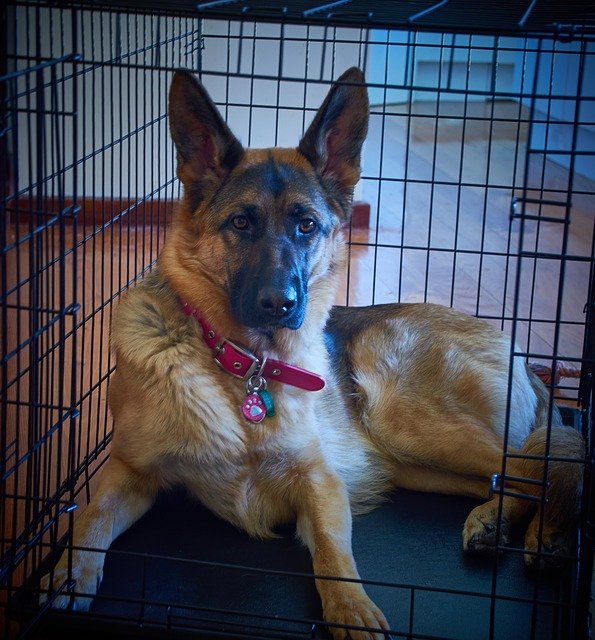Happy National Train Your Dog Month

By Dr. Lindsay Laird
Happy National Train Your Dog Month!
Not aware that January is National Train Your Dog Month? It was started in 2010 to raise awareness about the importance of training and socialization for a pet’s well-being. It makes sense for it to be the month of January given that the holidays often bring new furry additions to the family. It’s also a great time to resolve to refresh your current pet on the basics. As a veterinarian, dog training is very important to me because behavioral issues are cited as one of the main reasons that people give up their pets. I can also relate to this as the mother of a rescue dog who had four names at the shelter because that’s the number of times that he had been returned! Below are some tips and tricks that have helped not only my patients, but my own dogs over the years.
Crate Training
The crate should be a happy, safe place for your dog, not a punishment. Any time your dog goes in their crate reward him or her with treats. You can even try feeding them meals in the crate to further establish that good things happen here. Crate training can be for older dogs too, not just puppies. Start by putting your pet in the crate for a very brief period of time (while you’re home). The key is to reward your pet with treats and praise and let them out of the crate while they are being calm, BEFORE any barking or signs of agitation. Now, this may mean leaving Fluffy in the crate for just a few minutes or even seconds in the beginning. This is fine, you have to start somewhere, just gradually increase the amount of time your dog is in the crate and they will continue to become more comfortable with it with time.
House Training
This can be a very daunting task, especially for new dog owners. One thing that really helps to decrease accidents in the house is to keep your dog where you can see him or her. By doing this if your dog starts to urinate or defecate you can pick him or her up and take them immediately outside. When Fido finishes his business outside reward him with praise and treats. It’s often helpful to associate this with a phrase like “good outside” or “good potty.” Use the phrase you choose to praise your pet every time they pee or poop outside. Taking your dog out on a leash is very helpful when house training. This not only allows you to reward their good behavior instantly when they use the bathroom, but it will also help you know they have definitely relieved themselves and it’s ok to come back inside. Have a pet that gets easily distracted? “Ok I’m going outside to the bathroom- squirrel!!!” If you’ve circled the yard or the neighborhood and your dog has yet to relieve himself, bring him back inside, but limit him to one room or a small area of the house. Take him out again in 10 minutes or so. Continue this until he gets the idea he doesn’t get to roam free in the house until he’s taken care of business outside.
House training can take a lot of time and patience, but is well worth the effort in the end. As with all training consistency and repetition is key, so make sure everyone in the household is using the same training techniques. Older dogs who have been rescued or dogs that have had setbacks in the house training department can also benefit from the above strategies.
Obedience
Basic commands like “sit” and “stay” or “wait” can be very helpful when company comes to visit or when trying to pay the pizza delivery person without the dog running into the street. Teaching and practicing basic commands with your dog gets her used to listening to and taking direction from you. Dogs feel more confident and are less anxious when they know what’s expected of them and they can look to you set those expectations. Commands like “shake or paw” and “roll over”, even though they may seem like they are more for show, help reinforce your bond with your pet as well. When training your pet it’s best to use one word for each desired behavior. It can also be helpful to associate a hand motion with the command as well. Always remember to reward your pet with praise and treats for a job well done. To avoid excess weight gain, try using your dog’s kibble as training treats. If you find you’re going through a lot of dog food during training sessions, decrease the amount offered at meals.
If you would like more recommendations or have specific questions please call our team at Arnold Pet Station at 410-544-1130 to schedule a behavior visit or visit www.arnoldpetstation.com.
For additional information about this article, Contact Us. And Like us on Facebook for regular updates from Arnold Pet Station!
